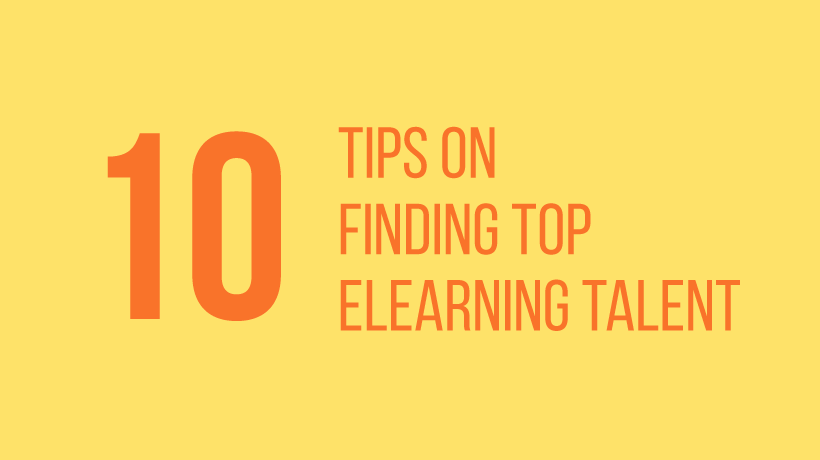Tips And Tricks On Finding Top eLearning Talent
A little blue notification pops up on my phone. Someone has sent me a message on LinkedIn. It reads something like this: “Hey Melissa, I was wondering if you know any amazing eLearning designer/developers you could refer for a role I have open?”
It’s a message I receive almost weekly and sometimes daily. My response is usually, “Ah, I don’t know anyone off the top of my head, but if you send me the job post link I will pass it on.” I almost always do.
Later in the day, I’m sitting in a conference room having a discussion with a leader in the industry. We’re talking about my current projects. I change the subject and let him know about the recent situation I have been in.
For me it’s a good situation to be in. I absolutely love the learning industry. I love meeting new people and learning about their passions. One of the most rewarding things to me is helping people to find their place in our field. I express this to him and also the downside of it, that is, the time it takes to orchestrate connections between hiring teams and talent.
He turns to me and states something like, “You should write a blog post that you can share with teams who are looking for eLearning talent.” What a brilliant idea, to be able to use my passion of blogging to write about my passion for making connections in the industry.
So, here are 10 of my tips for finding top eLearning talent talent.
1. Really Connect With The Community
It wasn’t until 2014 that I really became active in the online eLearning community. My biggest regret is waiting too long to get connected. Really connecting means building trust and relationships in the community. If you’re a leader in the industry who is building a team then you definitely want to be active in the community, whether that be on LinkedIn in groups and with connections/Reddit/Twitter or any of the other communities.
Being active means getting to know others in the community, sharing, and learning amongst everyone. You are going to reach way more people online than you ever would at a conference. People are more likely to work with you if they respect and trust you.
2. Ask Your Idols
Ask yourself, if I could hire anyone in the industry who would it be? Inquire with them to see if they would be interested in applying for the role. Don’t be shy, you miss 100% of the shots you don’t take. If they are not interested at the moment, tell them you’d love a referral to someone with a similar skillset. They will most likely be flattered and it’s good for them to make the connection in case they are ever interested in a role at your company in the future. You should also ask where a good place to look for talent would be.
3. Look Outside Of The Community
The one place that is often overlooked for corporate eLearning talent is the EdTech community. I have talked to many EdTech professionals who are looking for a change to a more corporate focused career. They have a passion for teaching/learning about learning and using technology. I think it’s worth it to check out EdTech meetup groups to see if anyone is a good fit for your open role.
4. Conference Backchannels On Twitter, Twitter Chats, And Twitter Lists
Twitter is a goldmine of eLearning talent. I will tweet asking a question at any time of the day on Twitter and someone in the eLearning community will respond immediately. These are the folks who are truly connected to the industry. They are on top of everything from myth busting the latest person who is promoting learning styles to sharing really cool projects people are working on.
The way that I got connected to eLearning peeps is through Twitter chats. Twitter chats occur on specific days at specific times. Someone leads by asking a question with a hashtag and the community answers indicating the question number and the same hashtag. You can learn more about different Twitter chats in this article.
It’s also worth it to look at industry leader’s Twitter lists. A Twitter list is comprised of Twitter accounts a person has selected for a list. There are thousands of lists in the community on a variety of topics in the field. Here is a look at one of my Twitter lists.
5. Check Conference Speaker Lists On Conference Sites
I haven’t run into too many speakers at learning conferences who are not passionate. If they’re speaking it’s most likely because they love what they do. Most websites for learning conferences will list the speakers and their topics. You can research these people a bit to figure out if they have a portfolio and fit your role well. It’s a good starting point.
6. Look For People Who Have Job History With Award Winning eLearning Vendors
I have this theory that some really good eLearning designers and developers come from eLearning vendor companies. It’s really just a theory though.
7. Universities
At the end of our graduate school program we had a day where companies came in to see our portfolios and interview us. Contact schools to see if they do something similar or inquire if they would be willing to. The benefit of looking for folks in graduate programs is that you will get an array of people with previous work experience and those new to the field.
8. eLearning Industry Community And Other Online Communities
The eLearning Industry community is a great place to look for eLearning talent. You can create your eLearning resume, find eLearning jobs or even post an eLearning job to the eLearning Industry's jobs board. There are also other communities out there such as the E-Learning Heroes community. Do a quick search for different eLearning authoring tools and more discussion forums should come up."
9. Join Or Start A Meetup
Every large city I have been in has user group meetups for authoring tools or some type of eLearning meetup. Check on meetup.com. I also know Articulate has a running list of user meetup groups. Start your own meetup, whether it is for monthly networking or building skills.
10. Search For Blogs And Portfolios
I think it’s extremely important for eLearning designers and developers to have a portfolio, even if it is small snippets of work they have done. Whenever I search eLearning designers on LinkedIn I immediately check their contact information for a portfolio. You can also look on sites like eLearning feeds to get a list of people who are actively writing in the industry. Search LinkedIn posts for keywords in the industry to see who is writing on LinkedIn about the industry.








